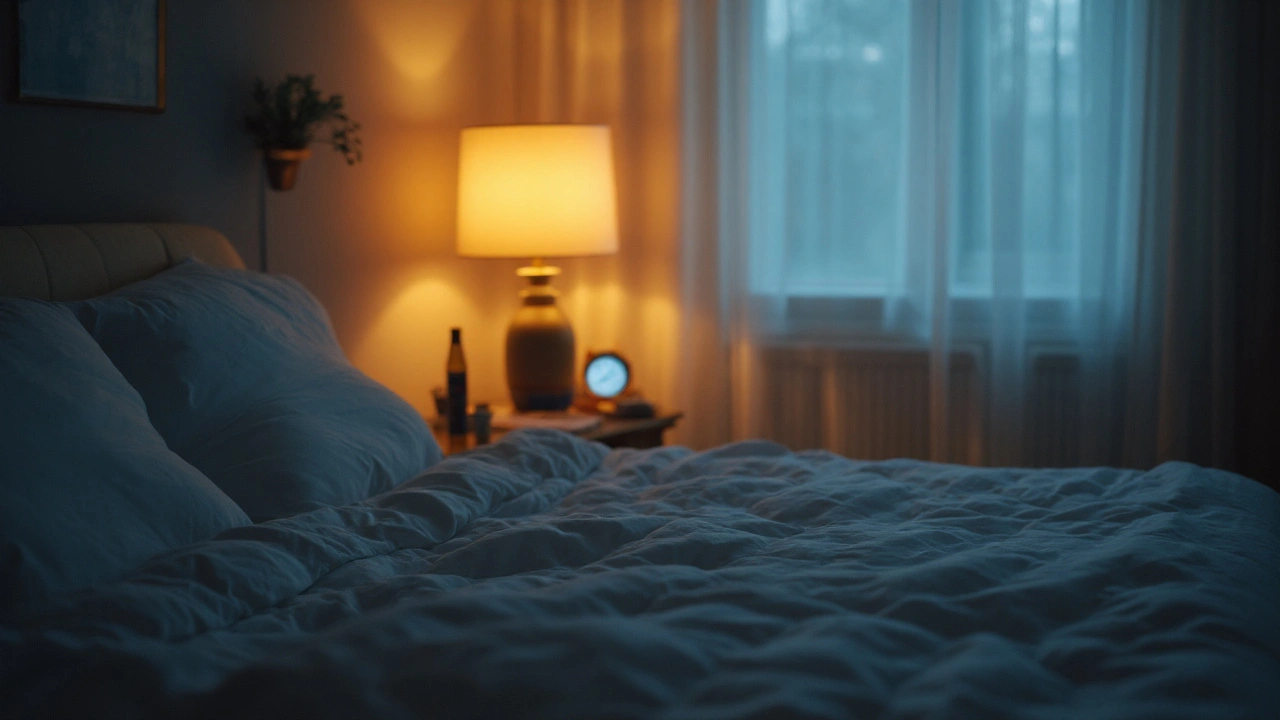TL;DR
- Unisom is an over‑the‑counter sleep aid that comes in two main formulas: diphenhydramine (Unisom D) and doxylamine (Unisom SleepTabs).
- Both act as antihistamines that make you drowsy; diphenhydramine is also used for allergies.
- Typical adult dose: 25‑50mg of diphenhydramine or 12.5‑25mg of doxylamine 30minutes before bed.
- Common side effects: dry mouth, grogginess, and occasional dizziness. Serious reactions are rare but can include heart palpitations or severe allergic response.
- Consider non‑medication sleep strategies first; if you need a backup, melatonin, valerian root, or prescription options may suit you better.
What Is Unisom?
Unisom is a brand name you’ll find on pharmacy shelves, marketed as a short‑term solution for occasional insomnia. The brand houses two active ingredients:
- Diphenhydramine - sold as Unisom D, Nighttime Sleep Aid, or Unisom Sleep Aid.
- Doxylamine succinate - sold as Unisom SleepTabs.
Both belong to the antihistamine family. While they’re designed to block histamine receptors that keep you awake, they also dry up nasal passages, which is why diphenhydramine doubles as an allergy pill.
How Unisom Works (and Why It Makes You Sleep)
Antihistamines cross the blood‑brain barrier and attach to H1 receptors in the brain. When those receptors are blocked, the brain’s arousal system calms down, leading to drowsiness. Doxylamine tends to be a bit more sedating than diphenhydramine, which is why Unisom SleepTabs are often the go‑to for people who find the diphenhydramine version less effective.
Because the medication works on the central nervous system, it doesn’t address the underlying reasons you can’t fall asleep (stress, caffeine, irregular schedule). That’s why doctors recommend using Unisom only a few nights a week, not as a nightly habit.
Dosage, Timing, and Practical Tips
Getting the dose right reduces the risk of morning grogginess and helps you fall asleep faster.
- Read the label. Unisom D tablets typically contain 25mg diphenhydramine; the recommended adult dose is one or two tablets.
- Unisom SleepTabs contain 12.5mg doxylamine; the usual adult dose is one tablet. Some people need two, but start with one.
- Take it 30minutes before bed. This gives the medication time to kick in without keeping you up.
- Avoid alcohol, caffeine, and heavy meals within a few hours of taking Unisom - they can interfere with the sedative effect.
- Never exceed the labeled maximum. For diphenhydramine, that’s 50mg per night; for doxylamine, 25mg.
- If you’re over 65 or have liver/kidney disease, cut the dose in half and talk to a pharmacist.
For kids, Unisom isn’t recommended unless a pediatrician prescribes a specific dose. The brand is meant for adults.

Safety, Side Effects, and When to Stop
Most people tolerate Unisom well, but the antihistamine class brings a predictable set of side effects.
| Common Side Effects | Less Common / Serious |
|---|---|
| Dry mouth, throat | Heart palpitations |
| Blurred vision | Severe rash or hives |
| Morning grogginess | Confusion, especially in older adults |
| Dizziness | Seizures (extremely rare) |
If you notice any of the serious reactions, treat it as an emergency - call 111 (New Zealand) or your local emergency number.
Long‑term use can lead to tolerance (you need more for the same effect) and, rarely, dependence. If you find yourself reaching for Unisom every night, it’s time to reassess your sleep habits.
Pregnant or breastfeeding women should avoid Unisom unless a doctor says it’s safe. The drug passes into breast milk and may affect the baby’s sleep cycles.
Alternatives and Complementary Strategies
Before you reach for an antihistamine, try these evidence‑backed methods. They’re free, have no side effects, and work well when you stick with them.
- Melatonin supplements. A low dose (0.5‑3mg) taken 30minutes before bedtime can reset your circadian rhythm.
- Sleep hygiene. Keep the bedroom cool, dark, and quiet. Limit screen time an hour before bed.
- Relaxation techniques. Deep breathing, progressive muscle relaxation, or a short mindfulness session can calm the mind.
- Caffeine cut‑off. Stop coffee, tea, and energy drinks after 2pm.
- Prescription options. For chronic insomnia, doctors may prescribe short‑acting hypnotics like zolpidem or ramelteon.
When you compare Unisom with these alternatives, consider a simple decision tree:
- Do you need a quick, occasional sleep aid? → Unisom (diphenhydramine or doxylamine).
- Do you prefer a non‑antihistamine supplement? → Melatonin.
- Is your insomnia frequent or severe? → Talk to a GP about prescription medication.
Remember, the best sleep aid is the one that works with your lifestyle without harming your health.
Mini‑FAQ: Quick Answers to Common Questions
- Can I mix Unisom with alcohol? No. Alcohol intensifies drowsiness and can cause dangerous breathing slowdown.
- How long does Unisom stay in my system? Diphenhydramine’s half‑life is about 4‑6hours; doxylamine’s is 10‑12hours. Expect residual grogginess the next morning, especially with higher doses.
- Is Unisom safe for my teen? Generally not. Antihistamines can impair growth and cause daytime sedation. Get a doctor’s advice.
- Can Unisom cause weight gain? Not directly, but dry mouth may lead to increased sugary drink consumption, which can add calories over time.
- Why am I still awake after taking Unisom? Stress, caffeine, or an underlying sleep disorder can override the medication’s effect. Review your sleep hygiene first.

Next Steps: How to Use This Information
If you’re considering Unisom, follow this short checklist before you purchase:
- Identify the cause of your sleeplessness (stress, environment, health).
- Try non‑medication strategies for a week.
- If you still struggle, choose the formula that matches your sensitivity: diphenhydramine for milder drowsiness, doxylamine for stronger effect.
- Read the label, respect the dosage, and set a reminder to stop after 2‑3 weeks of occasional use.
- Schedule a brief chat with a pharmacist or GP if you have chronic insomnia, are pregnant, or take other medications.
By treating Unisom as a short‑term tool rather than a nightly habit, you protect your health while getting the sleep you need.

